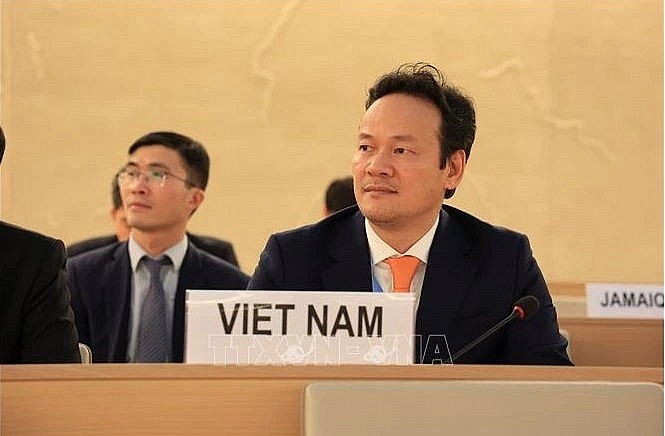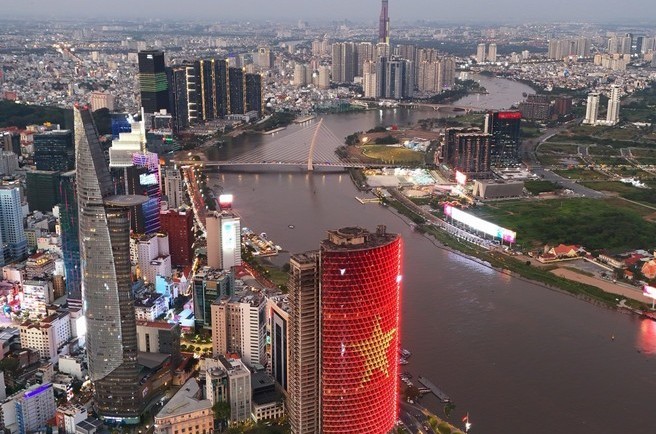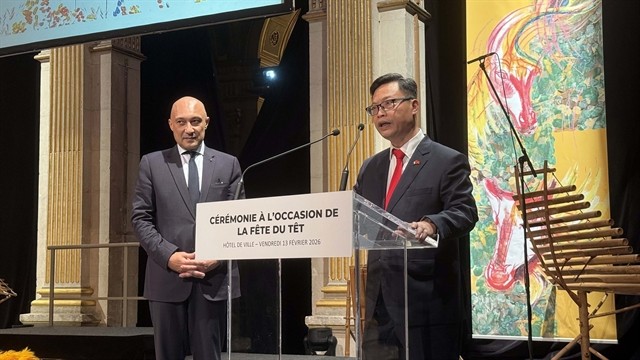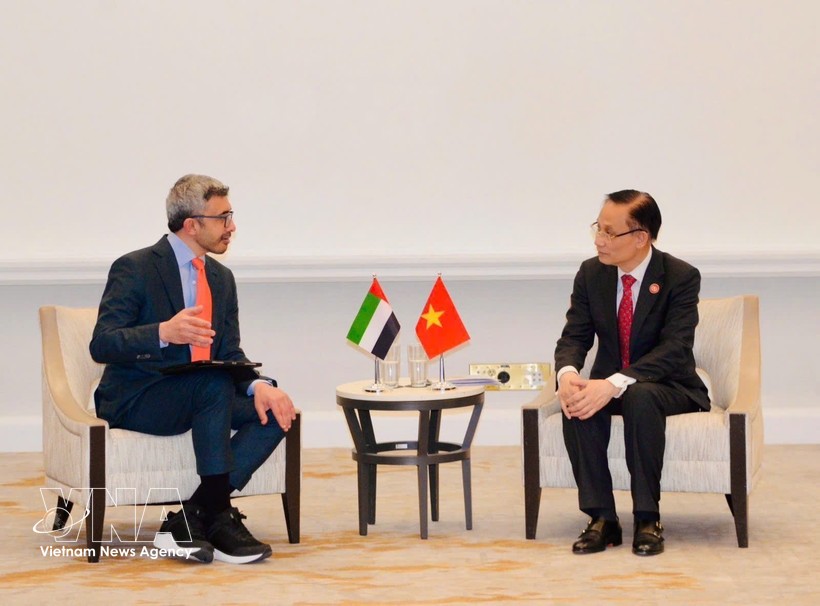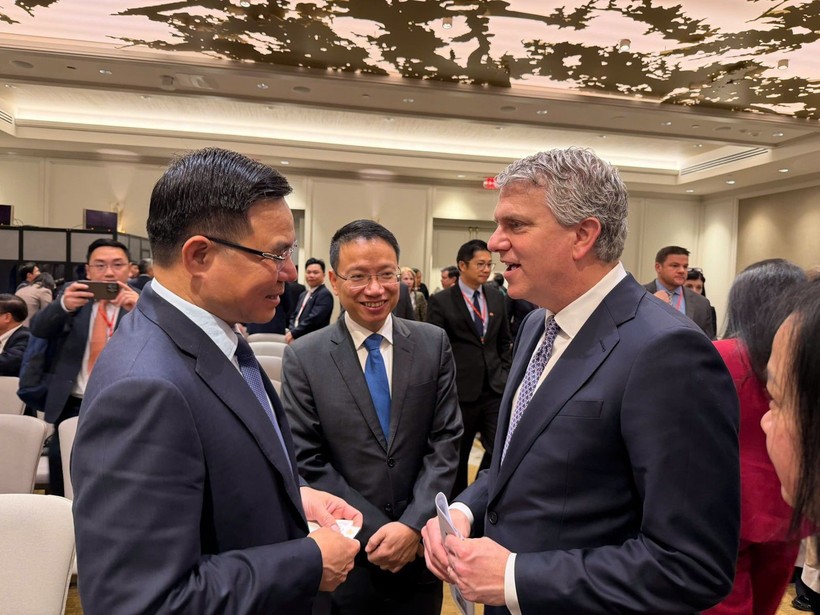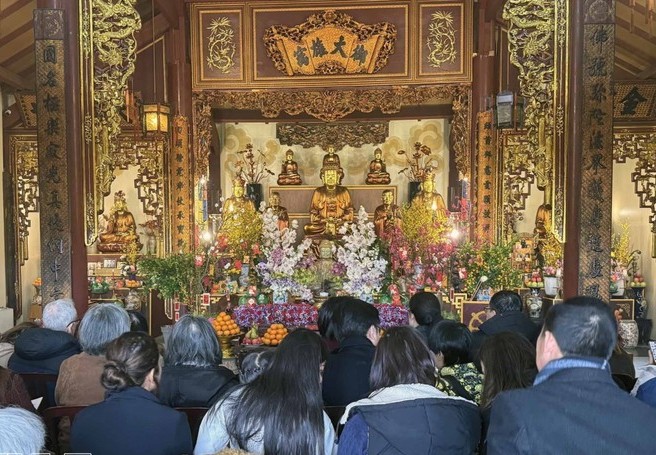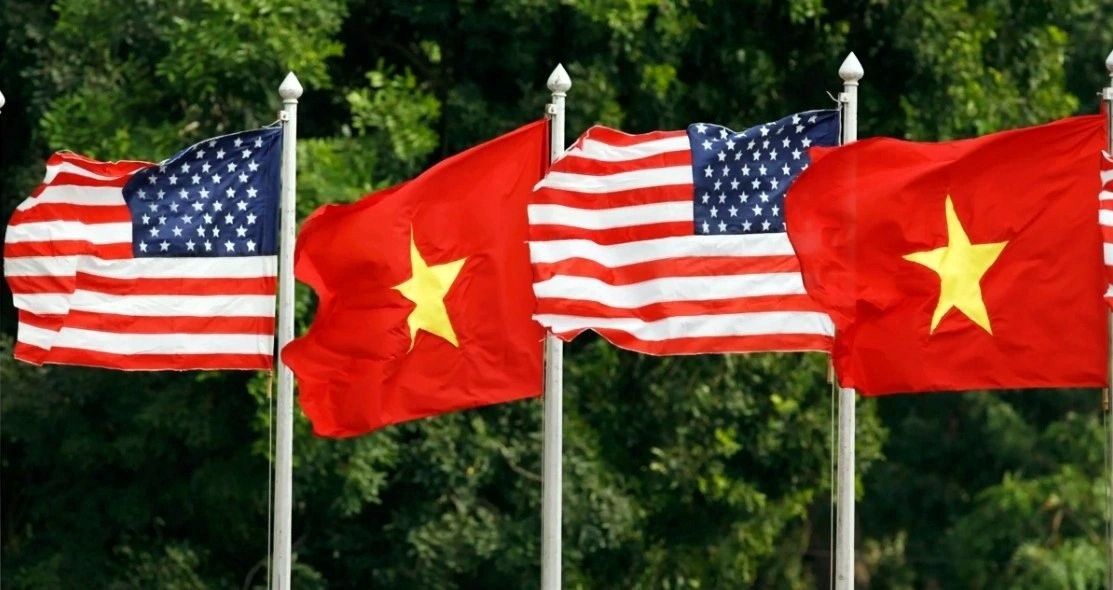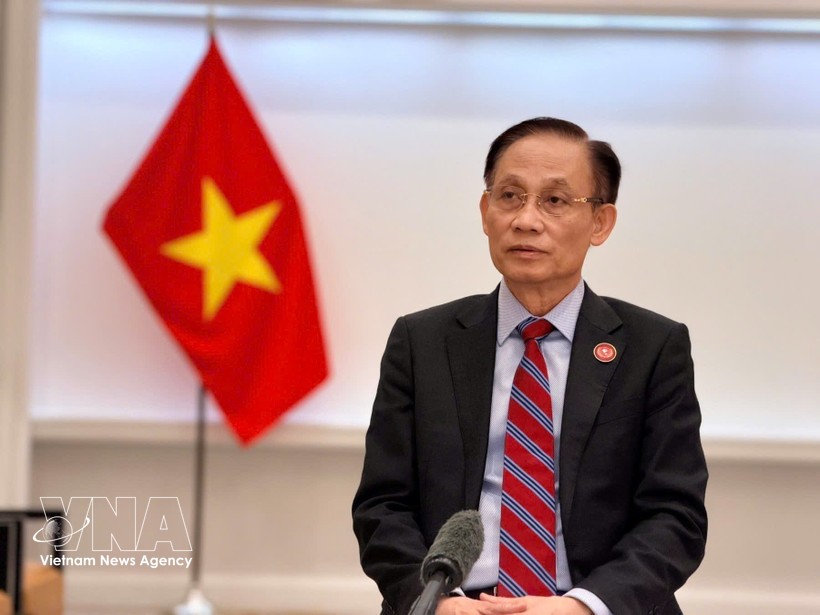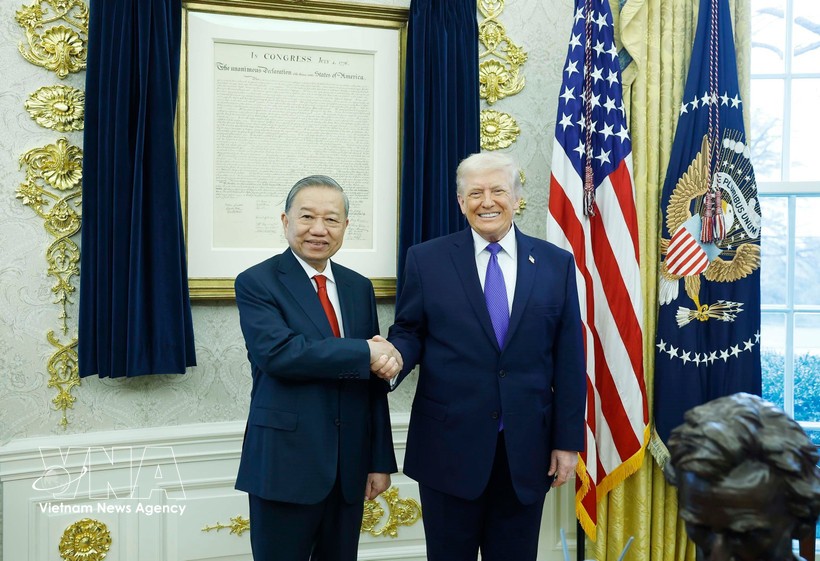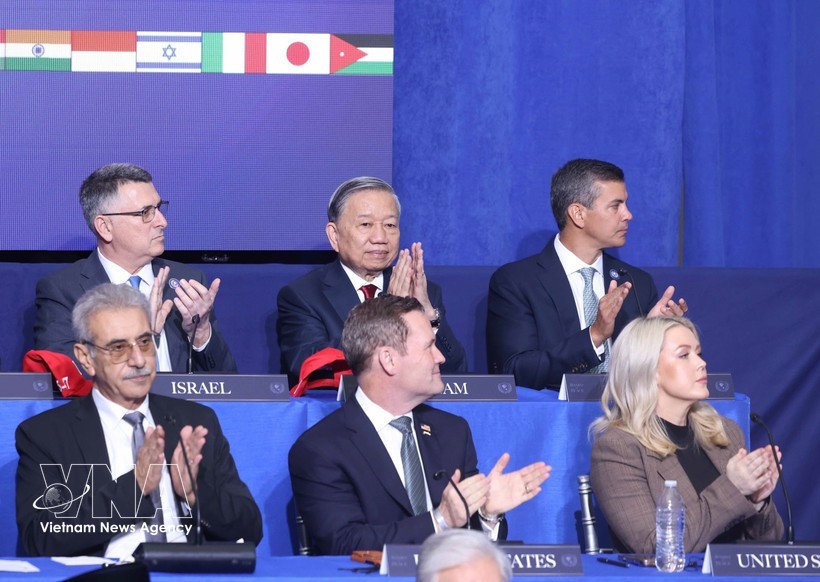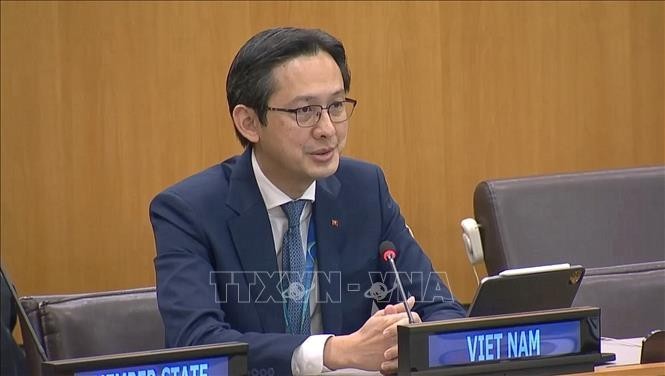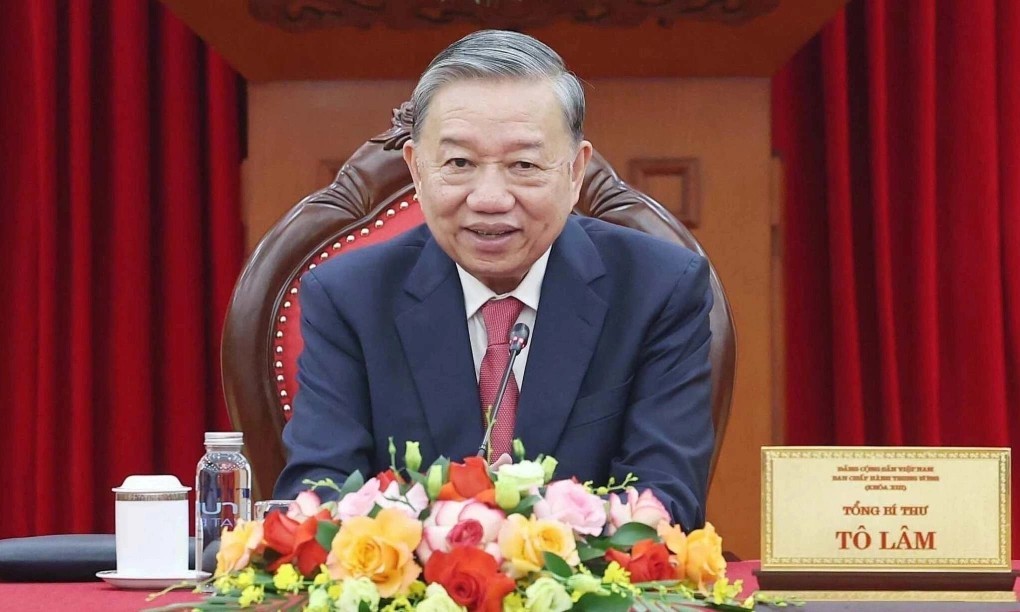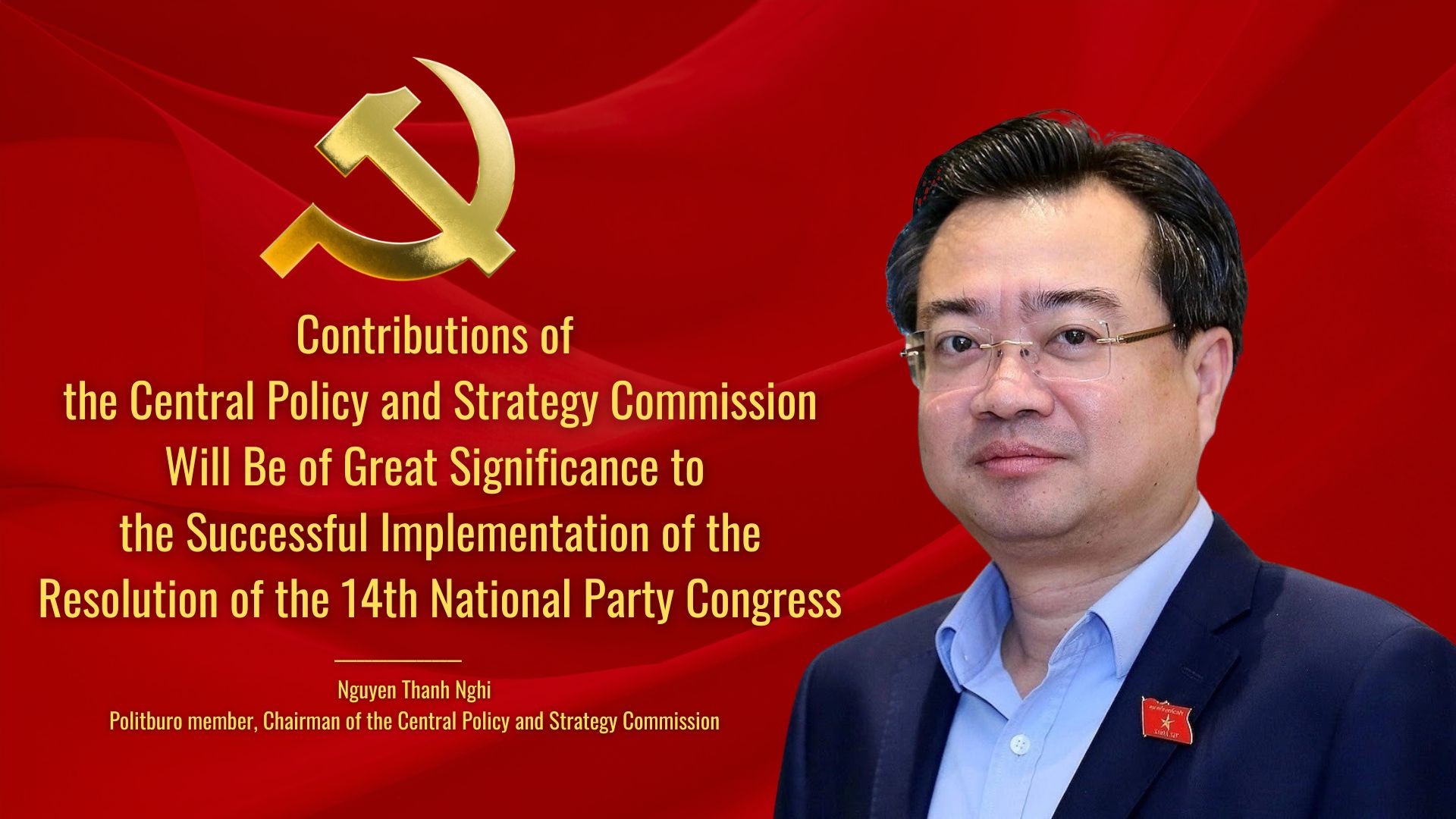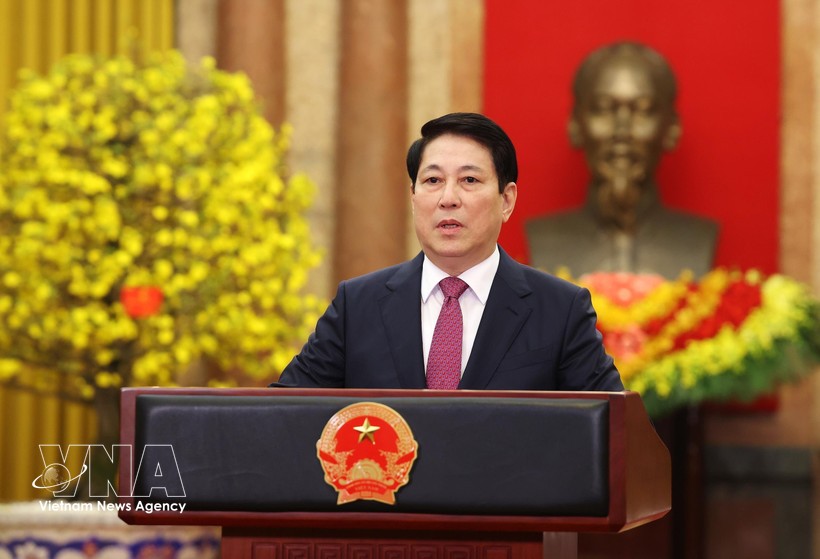Vietnam–Cuba timeless bond looks towards sustainable future
The Vietnam–Cuba relationship is a unique bond of brotherhood and solidarity, forged through their struggles against imperialism and in the process of building socialism, and stands as a lasting legacy that transcends geographical distance and cultural differences toward a sustainable future, according to Gerardo Penalver Portal, First Deputy Minister of Foreign Affairs of Cuba.
In an interview granted to the Vietnam News Agency on the occasion of the 65th anniversary of the diplomatic ties between the two countries, Peñalver Portal highlighted the special nature and key milestones in the bilateral relations, which have been strengthened by leaders of both countries.
He underlined the great potential for developing bilateral relations, stating that based on the solid foundation of this exemplary relationship, the two sides are committed to building a comprehensive, effective, substantive, and sustainable cooperation.
Nothing can hinder the shared aspiration of the two Parties, States, and peoples to reach new heights in mutually beneficial integration and to strengthen confidence in the future of the two nations, he said.
Through shared political will, historic brotherhood, and a common vision for sustainable development, Vietnam and Cuba have built a model alliance, which was forged in their struggle for national independence and now sustained by active cooperation in key areas such as agriculture, renewable energy, and healthcare, Peñalver Portal said.
He highlighted the significant progress in economic cooperation between the two countries, noting that since the bilateral trade agreement came into effect in April 2020, two-way trade has grown substantially, hitting 134.7 million USD in the first eight months of 2024, up 187% increase compared to the same period of 2023. He said that the agreement not only reduces tariffs but also paves the way for greater product and service diversification.
Vietnam has become the largest Asian investor in Cuba, with at least seven active projects worth over 160 million USD, mainly concentrated in the Mariel Special Development Zone (ZEDM).
One of the most notable examples of cooperation is in rice production. Vietnam has not only shared its technology but also sent experienced technicians to Cuba. Under the bilateral agricultural cooperation project implemented over the past decade, more than 4,700 ha of rice fields have been improved using laser technology, and nearly 6,000 km of irrigation canals and field roads have been upgraded.
In addition, there are projects in coffee and corn cultivation as well as aquaculture, with Vietnam providing seeds, expertise, and management models.
In the healthcare sector, solidarity between the two nations has been especially evident during challenging times such as the COVID-19 pandemic. Vietnam was one of the first countries to purchase 5 million doses of Cuba’s COVID-19 vaccine and also received an additional donation of 150,000 doses in September 2021. The two countries have jointly implemented projects in biotechnology and pharmaceutical production, including technology transfer, human resources training, and clinical trials.
The people and government of Cuba deeply appreciate Vietnam’s consistent stance in calling for an end to the economic, trade, and financial embargo imposed by the US against Cuba, he said.
Cuba and Vietnam have always supported each other in international organizations and at multilateral forums in which they are members, including events and forums of political parties. The two sides share a high level of consensus on issues of shared concern on the global agenda.
Campaigns to mobilize support and donate essential supplies, especially rice, regularly organised by Vietnamese organizations, businesses, agencies, and people have provided valuable assistance and strong moral support to Cuba, he noted, adding that the stable presence of Vietnamese enterprises in Cuba, with crucial production projects carried out despite challenges and constraints, clearly demonstrates determination, loyalty, and a hopeful commitment to the present and future, according to VNA.
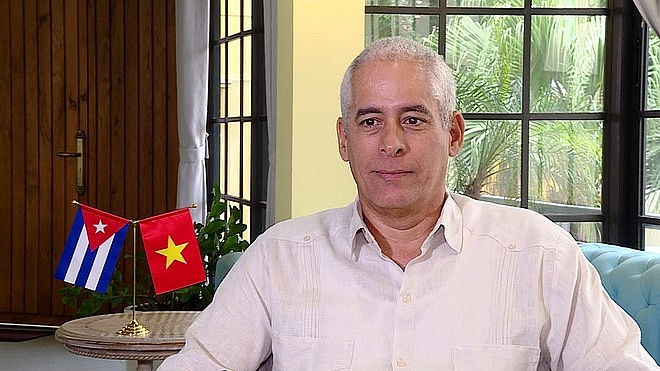 |
| Gerardo Penalver Portal, First Deputy Minister of Foreign Affairs of Cuba. (Photo: VNA) |
He emphasized that the outlook for Cuba–Vietnam cooperation in the years ahead is both strategic and full of promise, as both nations have reaffirmed their commitment to deepening their political, economic, scientific, and cultural partnership, with the shared goal of advancing toward a more comprehensive and mutually beneficial relationship.
The Cuban official stated that the two sides should focus on three key priorities - diversifying economic cooperation, strengthening collaboration in science and agri-industrial sectors, and promoting people-to-people and youth exchanges.
According to him, during the eighth political consultation in Hanoi recently between the two countries’ Ministries of Foreign Affairs, the two sides discussed key issues to advance the development strategy of bilateral relations. Vietnam and Cuba once again reaffirmed their stance in upholding peace and multilateralism, and promoting South-South cooperation.
On the economic front, discussions focused on expanding and diversifying cooperation in trade, production, and science. Meanwhile, cultural, educational, scientific, and technological sectors were also included in the dialogue agenda, with both sides proposing new forms of cooperation to promote mutual understanding and human development, he said.
A key highlight of this consultation round was the signing of the Political Consultation Plan for the 2026–2028 period, which is expected to help translate mutual consensus into concrete actions, aiming to enhance institutional coordination and ensure the effective implementation of cooperative projects, he noted.
In the coming time, key cooperation projects will be implemented to support the research, development, production, and commercialisation of pharmaceutical and biotechnology products invented by Cuban scientific centres in the Vietnamese market, the Cuban official noted, adding that efforts will also be made to promote energy cooperation.
Cuba is seeking high-quality Vietnamese enterprises and products in the fields of textiles and garment, footwear, fertiliser production, household appliances, IT equipment, solar batteries, electric vehicles, and hybrid vehicles for production and distribution in both the wholesale and retail markets of Cuba, he stated.
This year, Cuba inaugurated a research group dedicated to studying President Ho Chi Minh’s life and revolutionary career, he said, showing his hope that a similar group focusing on Fidel Castro Ruz will be established in Vietnam, along with the implementation of publishing projects on his ideology.
According to Peñalver Portal, artistic exchanges are also being actively promoted, creating opportunities for the people of both countries to appreciate each other’s rich cultures. In terms of academia, the two countries continue to maintain the exchange of university scholarships.
He expressed his belief that Vietnam will achieve its development goals, driven by the strong determination shown by the Party, the State, and the people in streamlining the political system and leveraging science, technology, innovation, and digital transformation as key drivers of socio-economic growth.
Five years of EVFTA keep Vietnam-EU trade on stable ground
Vietnam’s Trade Counselor in Germany, Dang Thi Thanh Phuong, has recently shared an overview of the achievements and outlook of the EU-Vietnam Free Trade Agreement (EVFTA) during a media interview in Berlin, marking five years since the agreement officially took effect in August 2020.
According to her, the EVFTA represents a major step forward in strengthening economic ties between Vietnam and the EU. It has opened up a wealth of opportunities for Vietnamese businesses, though not without posing a number of challenges that require ongoing efforts to overcome.
According to data from Vietnam Customs, bilateral trade between Vietnam and the EU grew by 46.5% between 2020 and 2024, reaching over US$64.6 billion, up from US$44.1 billion in the previous five-year period. Vietnam’s exports to the EU rose by 56.4%, from US$31.1 billion to nearly US$48.7 billion, while imports from the bloc increased by 13%, from US$14 billion to US$15.9 billion.
In the German market specifically, bilateral trade also recorded positive growth of 17%, with Vietnam’s exports to Germany surging by 20% and imports from Germany increasing by 13%.
While there has yet to be a marked breakthrough, the EVFTA has played a key role in sustaining the growth momentum of Vietnam–EU trade amid global disruptions such as the COVID-19 pandemic, the Russia–Ukraine conflict, and widespread supply chain fragmentation.
According to Counselor Phuong, the EVFTA has created major opportunities for Vietnam’s key export sectors to capitalize on the elimination of import tariffs. As soon as the agreement came into force, the EU removed import duties on 85.6% of tariff lines, equivalent to 70.3% of Vietnamese export value to the EU. After seven years, this figure is expected to rise to 99.2%, meaning nearly all of Vietnam’s exports to the bloc will benefit from preferential tariffs.
Several product groups, such as rice, coffee, seafood, fruit and vegetables, garments and textiles, and footwear, have been eligible for 0% tariff rates from the outset, enabling Vietnamese businesses to boost their competitiveness and expand into new markets.
This advantage has been especially evident in agricultural and aquatic products such as coffee, seafood, cashew nuts, and tea, which have seen strong growth. Specifically, Vietnam’s coffee exports to the EU soared by 120%, from US$983 million in 2020 to US$2.2 billion in 2024. Fruit and vegetable exports rose by 65.6%, from US$146 million to US$242 million. Footwear exports grew by 52.4%, from US$3.7 billion to US$5.65 billion. These results clearly demonstrate the effective use of EVFTA tariff preferences, particularly by major enterprises that have focused on improving product quality, meeting rules of origin requirements, and building sustainable brands.
However, Counselor Dang Thi Thanh Phuong noted that sectors such as garments and textiles, footwear, wood products, and pharmaceuticals still face numerous challenges in fully leveraging the EVFTA’s benefits. The main obstacles stem from internal factors such as outdated production technology, limited investment in design and branding, and difficulties in meeting origin requirements. In addition, technical barriers and stringent standards on product origin, technology, and design continue to limit the competitiveness of many Vietnamese enterprises.
In addition, according to Phuong, the pharmaceutical industry has yet to show meaningful progress, mainly due to weak domestic capacity, the absence of EU-standard GMP certification, and limited competitiveness against European generics. In the wood processing sector, the drop in export value highlights the challenges enterprises face in proving legal timber origin and adapting production technologies to meet evolving market demands.
Echoing the view shared by many trade experts that the EVFTA has served as a driver for institutional reform and sustainable development in Vietnam, particularly through its provisions on labor, environmental standards, and intellectual property, Counselor Phuong noted that Vietnam has made clear efforts to align with these commitments.
These include ratifying key ILO conventions such as Convention No. 98 on the right to organize and to engage in collective negotiations between workers and employers, and Convention No. 105 on the abolition of forced labor. The implementation of the revised Labor Code, effective from 2021, has also allowed for the establishment of worker representative organizations at the enterprise level outside the official Vietnam General Confederation of Labor system, bringing domestic regulations more closely in line with EVFTA requirements.
Additionally, Vietnam has passed the 2020 Law on Environmental Protection, which emphasizes sustainable development, extended producer responsibility (EPR), environmental impact assessment, and greater community participation. The country is also carrying out its commitments under the 26th UN Climate Change Conference of the Parties (COP26), including the target of achieving net-zero emissions by 2050.
In 2022, Vietnam amended its Law on Intellectual Property to strengthen IP protection. The revisions clarified regulations on geographical indications, patents, and copyright, improved enforcement mechanisms, and increased penalties and measures for IP violations, VOV reported.
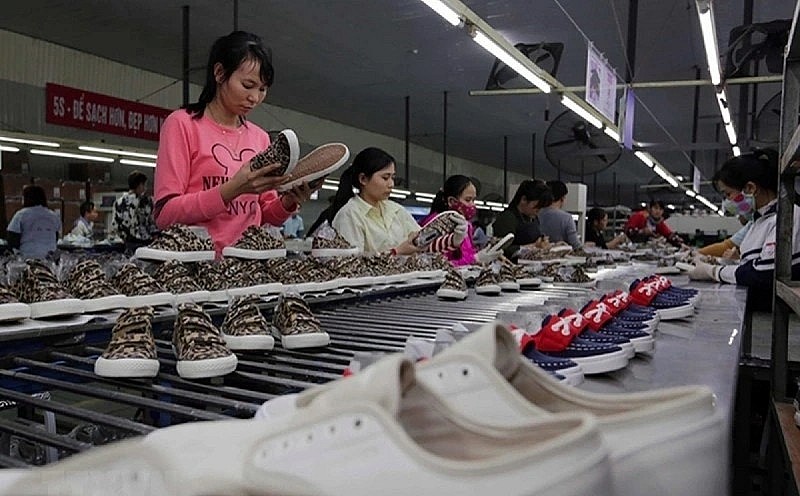 |
| Footwear remains a major export category in Vietnam-EU trade. |
It can be said that Vietnam has made great strides in institutional reform to implement the EVFTA, particularly in the areas of labor, the environment, and intellectual property. However, practical implementation still faces a number of limitations – for example, the effectiveness of labor organizations, the enforcement of intellectual property rights, and the consistency of environmental law enforcement remain uneven.
Continued efforts are needed to intensify the effective implementation of commitments, accelerate the participation of businesses and the public, raise awareness among enterprises about the EVFTA and relevant international standards, and further improve regulatory transparency, public accountability, and international cooperation.
Counselor Dang Thi Thanh Phuong noted that the implementation of the EVFTA is expected to continue benefiting Vietnamese businesses, as more products will enjoy further tariff reductions. By 2027, the EU is set to eliminate around 99.2% of tariff lines, covering approximately 99.7% of Vietnam’s export revenue to the bloc.
She added that in the current context, where the United States is tightening trade measures against several countries, both the EU and Vietnam must diversify their markets and partners. Vietnam holds a significant advantage in this regard, having already signed a free trade agreement with the EU that includes ambitious tariff commitments across many of its key export categories.
To fully realize the long-term benefits of the EVFTA, Counselor Dang Thi Thanh Phuong emphasized that Vietnam must take stronger steps to upgrade its production capacity, speed up green and sustainable transformation, develop high-quality human resources, and boost localization. This is not only an opportunity to expand market access, but also a lever to shift the country’s growth model and enhance Vietnam’s position in regional and global value chains.
She further noted that as the EU steps up its market diversification efforts, having signed a free trade agreement with the MERCOSUR bloc in December 2024 and actively negotiating FTAs with Thailand, Indonesia, Australia, and New Zealand, Vietnamese enterprises must act quickly to sharpen their competitiveness and meet market standards. Otherwise, they risk losing their current advantages, especially as direct competitors gain similar access to the EU through existing and upcoming FTAs.
Vietnam–Switzerland ties steadily advancing: Diplomat
Vietnam and Switzerland have enjoyed steadily growing relations, with development cooperation and economic ties serving as key pillars of the partnership, according to former Swiss Ambassador to Vietnam Ivo Siber.
In an interview granted to the Vietnam News Agency (VNA) in Geneva on the occasion of National Assembly (NA) Chairman Tran Thanh Man’s participation in the sixth World Conference of Speakers of Parliament, Siber underlined that since the start of diplomatic relations in 1971, bilateral ties have grown stronger and stronger. Development and economic cooperation has been the primary engine behind this progress since the early 1990s and is expected to be further promoted in the coming time.
He said Switzerland strongly supported Vietnam's accession to the World Trade Organisation (WTO), which paved the way for new opportunities for both Vietnam and Swiss businesses. Swiss enterprises have so far invested over 2 billion USD in Vietnam.
Beyond economic ties, bilateral relations have also broadened into areas such as cultural exchange, tourism, people-to-people links, and political dialogue.
Siber expressed optimism that high-level contacts between the two nations will inject fresh momentum into negotiations on a Free Trade Agreement (FTA) between Vietnam and the European Free Trade Association (EFTA), of which Switzerland is a member. He highlighted the EU–Vietnam Free Trade Agreement (EVFTA), signed in 2020, as a successful model demonstrating the value of such accords in strengthening ties in trade, investment, and beyond.
The next round of official negotiations between Vietnam and EFTA is expected to take place in early September in Geneva. Parliamentary delegations from EFTA member countries are also coordinating with their Vietnamese counterparts in preparation for a visit to Vietnam next spring, cited VNA.
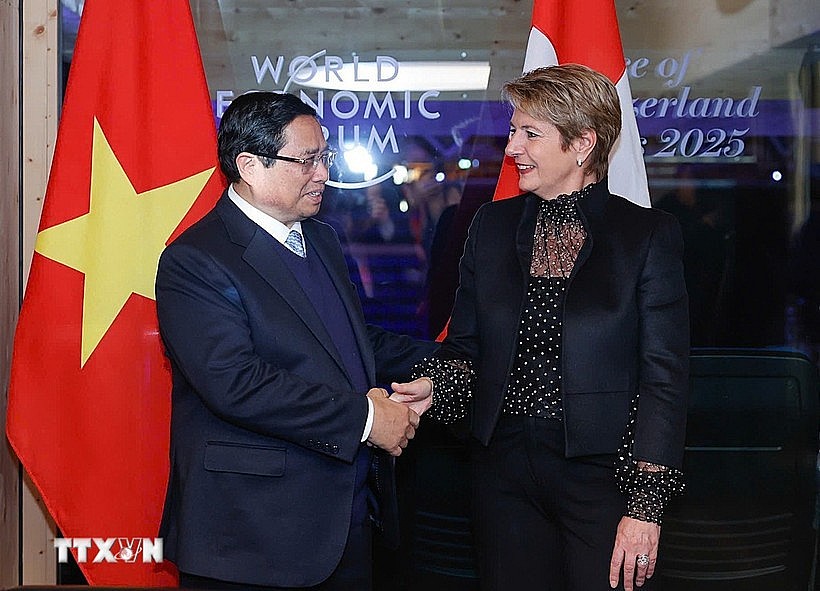 |
| Vietnamese PM Pham Minh Chinh (left) meets with Swiss President Karin Keller-Sutter during his trip to attend the 55th annual meeting of the World Economic Forum in Davos, Switzerland, on January 21, 2025. (Photo: VNA) |
Amid recent disruptions in the global trading environment, Siber stressed that a timely conclusion of the EFTA–Vietnam FTA will boost trade and investment flows. With shared interests and Switzerland’s consistent commitment to international cooperation and the rule of law, both countries are well-positioned to achieve mutually beneficial outcomes that extend beyond a conventional trade pact.
He emphasized that ongoing dialogue and the identification of common values will help both sides strengthen collaboration for shared progress. Chairman Man’s current visit to Switzerland and the revival of FTA talks are concrete steps forward, reinforced by cooperation momentum within ASEAN, the United Nations, various multilateral frameworks, and the Swiss–Vietnam Economic Forum (SVEF).
Vietnam makes strides in fight against human trafficking: IOM
Vietnam has made tremendous progress in combating human trafficking in recent years, said Kendra Rinas, Chief of Mission for the International Organization for Migration (IOM) in Vietnam.
Kendra Rinas made the above statement on the occasion of World Day Against Trafficking in Persons (July 30, 2025).
The Chief of Mission highlighted efforts made by Vietnamese authorities in the fight against human trafficking, noting that under the leadership of the Government and the Ministry of Public Security, in coordination with relevant agencies, the revised Law on Human Trafficking Prevention and Control officially took effect on July 1, 2025.
One of the key highlights of the revised law is its emphasis on a victim-centered approach in the policymaking process, she said, adding that the revised law ensures support for all groups of Vietnamese nationals, foreigners, stateless persons, and minors.
According to Rinas, the revised law is an important step, reinforced by the ongoing 5th National Plan of Action, which covers 2021 to 2025, and looks ahead to 2030. These efforts mark 25 years of coordinated action against trafficking, which is commendable.
She also applauded Vietnam for strengthened efforts in investigations, prosecutions, and convictions for trafficking crimes, saying that since 2019, IOM and its partners have provided assistance to more than 840 trafficking victims and vulnerable migrants, and over 1,380 Vietnamese law enforcement officers have received training.
Significant progress has also been made in assisting Vietnamese nationals rescued from scam compounds to safely return home, however, trafficking in persons (TIP) screening processes still require more consistency and coordination, Rinas said.
IOM is committed to addressing these gaps by furthering collaboration with the Ministry of Health, and the Border Guard High Command of Vietnam, especially in screening of potential victims of trafficking for forced criminality, she stressed.
The official said human trafficking is a complex issue, requiring a comprehensive approach from the government, adding that her agency is pleased to see multiple government agencies at central and local levels engaged in these issues.
According to Rinas, trafficking is becoming more sophisticated and organized. Networks that operate with precision, often leveraging digital platforms to recruit victims, including young people who are educated and tech-savvy.
IOM's Regional Situation Report on Trafficking in Persons into Forced Criminality in Online Scamming Centers shows that the number of trafficking victims forced into criminal activities, who received IOM's support in Southeast Asia, more than tripled, from 296 in 2022 to 1,093 so far in 2025.
Kendra Rinas suggested Vietnam pay attention to trafficking for forced criminality, such as cyber scam compounds, as well as emerging cases involving organ trafficking, infant trafficking, and even trafficking of unborn children, she said, noting that that's why the revised human trafficking law in Vietnam now contains explicit provisions to protect unborn victims.
Frontline officers face a variety of challenges as traffickers are adapting rapidly, exploiting legal loopholes, and shifting their activities into the online sphere, making detection and prevention even more complex.
The way forward
To overcome these challenges, it is vital to continue raising public awareness about the complex risks of trafficking, strengthen law enforcement capacities to effectively investigate and prosecute traffickers, and ensure that all victims receive adequate protection and support.
IOM is proud to stand alongside the Vietnamese Government in driving these efforts forward and remains committed to supporting every aspect of this important work, she stated.
Rinas underlined the importance of enhance data management and ensure that all TIP data is integrated into a national database, saying that this is crucial for evidence-based policies and effective prosecution, cited VGP.
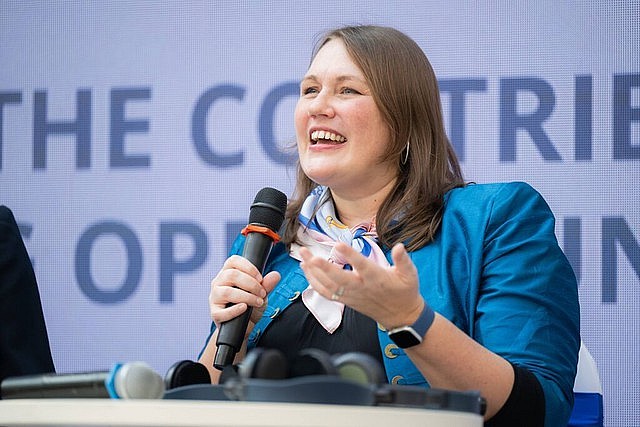 |
| Chief of Mission for the International Organization for Migration (IOM) in Viet Nam Kendra Rinas. |
IOM aims to enhance Vietnam's database on trafficking in persons and international migration and improve the legal framework for migration governance to align with international standards, she said.
She stressed the necessity to expand training for law enforcement and the judiciary so they are fully up to date on the changes with the related legal frameworks, adding that every victim - regardless of their status - should have equal access to protection and support, as required by the 2025 law.
Kendra Rinas urged Vietnam to foster partnerships, noting that strong collaboration between the government, civil society, and technology companies is crucial. She said promoting responsible business conduct across supply chains will help prevent corporate complicity in trafficking.
Attention should also be paid to boosting public awareness and empowering at-risk groups, she went on, saying that under the support of the UK Home Office, IOM has collaborated with government agencies and local actors to reduce vulnerabilities to human trafficking through behavior change communication, and strengthened access to information on safe migration, and TIP prevention.
Empowering the youth to lead initiatives that promote safe migration and prevent TIP is essential, and these efforts equip youth with the knowledge, resources, and skills to advocate for safer migration options, helping them make informed decisions and build resilience within their communities, she noted.
United for trafficking-free future
"IOM is also proud of our contribution to improving access for low-skilled workers to essential skills such as digital, soft, job application, and entrepreneurship skills. In partnership with relevant Vietnamese government agencies and Microsoft, IOM developed the e-learning platform congdanso.edu.vn, benefiting over 13,000 Vietnamese learners, especially internal migrant workers," she said.
Rinas underlined the importance of collaboration, innovation, partnership, and youth leadership in the fight against human trafficking, calling for joining hands in supporting victims, holding perpetrators accountable, and striving for a world where no one is bought, sold, or exploited.
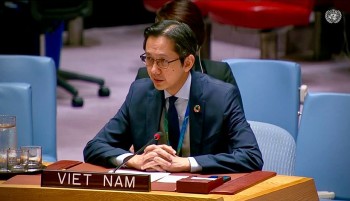 | Vietnam News Today (Jul. 25): Vietnam to Remain Resilient in 2025–2026 Despite Global Uncertainties Vietnam News Today (Jul. 25): Vietnam calls for reinforcing multilateralism, peaceful dispute resolution; Vietnam voices concern over escalating tensions along Thailand-Cambodia border; Vietnamese association partners ... |
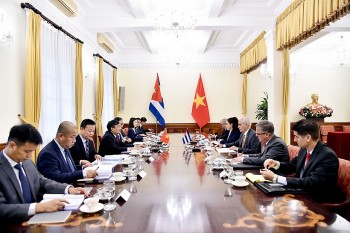 | Vietnam News Today (Jul. 26): Vietnam and Morocco pledge to boost free and sustainable trade ties; Vietnam, Cuba commit to stronger ties during eighth political ... |

